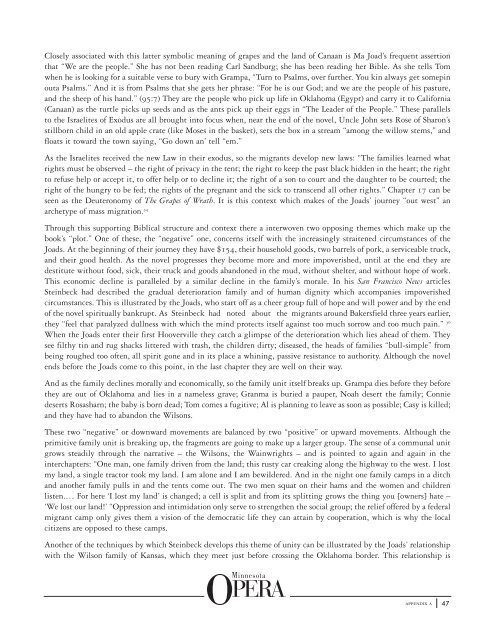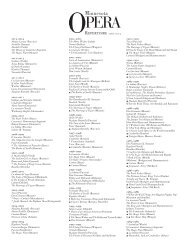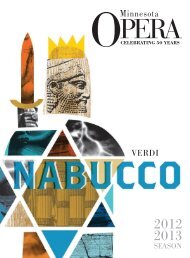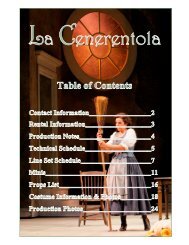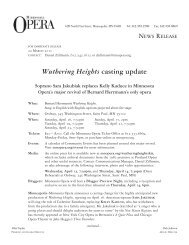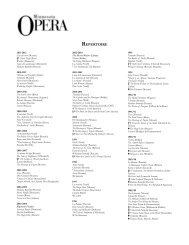You also want an ePaper? Increase the reach of your titles
YUMPU automatically turns print PDFs into web optimized ePapers that Google loves.
Closely associated with this latter symbolic meaning of grapes and the land of Canaan is Ma Joad’s frequent assertion<br />
that “We are the people.” She has not been reading Carl Sandburg; she has been reading her Bible. As she tells Tom<br />
when he is looking for a suitable verse to bury with Grampa, “Turn to Psalms, over further. You kin always get somepin<br />
outa Psalms.” And it is from Psalms that she gets her phrase: “For he is our God; and we are the people of his pasture,<br />
and the sheep of his hand.” (95:7) They are the people who pick up life in Oklahoma (Egypt) and carry it to California<br />
(Canaan) as the turtle picks up seeds and as the ants pick up their eggs in “The Leader of the People.” These parallels<br />
to the Israelites of Exodus are all brought into focus when, near the end of the novel, Uncle John sets Rose of Sharon’s<br />
stillborn child in an old apple crate (like Moses in the basket), sets the box in a stream “among the willow stems,” and<br />
floats it toward the town saying, “Go down an’ tell “em.”<br />
As the Israelites received the new Law in their exodus, so the migrants develop new laws: “The families learned what<br />
rights must be observed – the right of privacy in the tent; the right to keep the past black hidden in the heart; the right<br />
to refuse help or accept it, to offer help or to decline it; the right of a son to court and the daughter to be courted; the<br />
right of the hungry to be fed; the rights of the pregnant and the sick to transcend all other rights.” Chapter 17 can be<br />
seen as the Deuteronomy of The <strong>Grapes</strong> of Wrath. It is this context which makes of the Joads’ journey “out west” an<br />
archetype of mass migration. 34<br />
Through this supporting Biblical structure and context there a interwoven two opposing themes which make up the<br />
book’s “plot.” One of these, the “negative” one, concerns itself with the increasingly straitened circumstances of the<br />
Joads. At the beginning of their journey they have $154, their household goods, two barrels of pork, a serviceable truck,<br />
and their good health. As the novel progresses they become more and more impoverished, until at the end they are<br />
destitute without food, sick, their truck and goods abandoned in the mud, without shelter, and without hope of work.<br />
This economic decline is paralleled by a similar decline in the family’s morale. In his San Francisco News articles<br />
Steinbeck had described the gradual deterioration family and of human dignity which accompanies impoverished<br />
circumstances. This is illustrated by the Joads, who start off as a cheer group full of hope and will power and by the end<br />
of the novel spiritually bankrupt. As Steinbeck had noted about the migrants around Bakersfield three years earlier,<br />
they “feel that paralyzed dullness with which the mind protects itself against too much sorrow and too much pain.” 36<br />
When the Joads enter their first Hooverville they catch a glimpse of the deterioration which lies ahead of them. They<br />
see filthy tin and rug shacks littered with trash, the children dirty; diseased, the heads of families “bull-simple” from<br />
being roughed too often, all spirit gone and in its place a whining, passive resistance to authority. Although the novel<br />
ends before the Joads come to this point, in the last chapter they are well on their way.<br />
And as the family declines morally and economically, so the family unit itself breaks up. Grampa dies before they before<br />
they are out of Oklahoma and lies in a nameless grave; Granma is buried a pauper, Noah desert the family; Connie<br />
deserts Rosasharn; the baby is born dead; Tom comes a fugitive; Al is planning to leave as soon as possible; Casy is killed;<br />
and they have had to abandon the Wilsons.<br />
These two “negative” or downward movements are balanced by two “positive” or upward movements. Although the<br />
primitive family unit is breaking up, the fragments are going to make up a larger group. The sense of a communal unit<br />
grows steadily through the narrative – the Wilsons, the Wainwrights – and is pointed to again and again in the<br />
interchapters: “One man, one family driven from the land; this rusty car creaking along the highway to the west. I lost<br />
my land, a single tractor took my land. I am alone and I am bewildered. And in the night one family camps in a ditch<br />
and another family pulls in and the tents come out. The two men squat on their hams and the women and children<br />
listen.… For here ‘I lost my land’ is changed; a cell is split and from its splitting grows the thing you [owners] hate –<br />
‘We lost our land!’ “Oppression and intimidation only serve to strengthen the social group; the relief offered by a federal<br />
migrant camp only gives them a vision of the democratic life they can attain by cooperation, which is why the local<br />
citizens are opposed to these camps.<br />
Another of the techniques by which Steinbeck develops this theme of unity can be illustrated by the Joads’ relationship<br />
with the Wilson family of Kansas, which they meet just before crossing the Oklahoma border. This relationship is<br />
appendix a<br />
47


